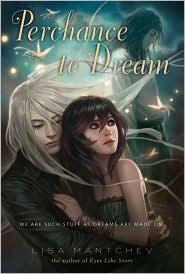The Tempest, part 6: A conversation with Lisa Mantchev

Today, another conversation with Lisa Mantchev, author of The Théâtre Illuminata series, the first two books of which are currently available in stores everywhere. You can read my reviews of Eyes Like Stars and Perchance to Dream, and/or my interview with Lisa for the Summer Blog Blast Tour in the linked-up earlier entries, if'n you want, as well as our conversation about Ophelia, which I posted last week. Lisa is a bit of an expert on these plays herself, due to her theatre training, and because Ophelia (from Hamlet) and Ariel (from The Tempest) are both important characters in the Théâtre Illuminata books. See the cover from Perchance to Dream there on the right? That white-haired boy is Ariel. Ooh! And before I move on, I simply must pimp the book trailer for PTD, which is quite possibly the most gorgeous book trailer I've ever seen - it involves a custom-made pop-up book, and it is STUNNING:

Kelly: Prospero: Hero or villain? I'd love to know your thoughts on this, since I see him as a complete mish-mash of a character. On the one hand, he behaved improperly (when he was still the Duke) by ceding his authority to his brother in order to study magic, and by causing the shipwreck. On the other hand, he doesn't allow anyone to be killed, even the true malefactors who sought his own death and/or seek the death of others during the course of the play.

Lisa: My take on Prospero isn't very flattering . . . I always pictured him as a blowhard nincompoop (something entirely due to one of Noel Streatfield's books, Theater Shoes, in which Sorrel's pompous uncle plays him onstage) and it's an image that's stuck with me over the years. Certain incarnations of the character are certainly more likable--it's easy to picture him as a Shakespearean version of Dumbledore, really!-but at the end of the day, he's a bit of a tyrant and a slave owner.

Kelly: Dumbledore? Really? Because Dumbledore seems so much more complex and competent to me than Prospero.
*ponders this further and seeks appropriate HP analogy*
For blowhard nincompoop, I suppose there's always Gilderoy Lockhart. What say you to that?

Lisa: You're right. It's only in his own head that Prospero is like Dumbledore . . . wise and magnanimous. But really, he's much more Gilderoy, who thinks he is doing mankind this huge favor just by showing up. There's potential for sympathy in this character, depending upon direction and casting, and I'm SLOBBERING to see Helen Mirren portray the feminine version, Prospera, but hold out no hope that movie will be released any time soon!
Note to readers: There exists in a can somewhere a completed film version starring Helen Mirren as Prospera, and the following additional cast members: Felicity Jones as Miranda, Djimon Honsou as Caliban, Ben Whishaw as Ariel, Alfred Molina as Stephano, Russell Brand as Trinculo (brilliant casting for the drunken servants), Alan Cumming as Sebastian, Chris Cooper as Antonio, and David Strathairn as Alonso. Like Lisa, I am salivating for this production, which was directed by Julie Taymore. Here's the rub: It was a Miramax project, and Miramax has gone under, so it was temporarily derailed, but late word is that it has undergone some recent advanced screenings and is probably going to be a December release. Early reports are that the movie completely rocks (with the possible exception of the guy playing Ferdinand).

Kelly: Man, I can't wait to see that either. *taps foot impatiently*
About Prospero's use of magic: Why do you think he gave it up at the end? After all those years of study and practice and exile, and then to come into his own as a powerful mage, I didn't quite understand why he felt the need to give up the practice of magic in order to return to society. Couldn't he have returned as a magically powerful Duke, rather than choosing one or the other? Or is that the "message" of the play - that one must choose the world of magic OR the world of men?

Lisa: I always felt that his powers were strongly tied to the island.
(Oh, dear, now I'm imagining the Lost version of The Tempest!)
*ahem* As I was saying, I think quite a lot of his great powers and abilities had to be tied to his place of exile, that he was drawing strength from it, as well as Ariel's air-magic. So I do think it's the world of magic or the world of men decision: would he have wanted to remain on the island, alone? What good is power if there's no one over which to wield it? He had freed Ariel, after all . . .

Kelly: I think that the Lost version of The Tempest would make more sense than the Lost version of Lost. I just hope that Naveen Andrews is in it, because I think he's dead sexy.
So do you think that most of Prospero's actual power was "borrowed" from Ariel, and wasn't really his own? Are his powers always the power to command (people as the Duke, supernatural beings as the mage)?

Lisa: I don't think all Prospero's magic came from the island, but it did feel every elemental to me (creating the namesake tempest from the waters, commanding Ariel, and enslaving Caliban, who is a very earthy, tortured character.) Elemental manipulation would have smacked of witchcraft and occultism to an Elizabethan audience, and Shakespeare could hardly reward someone who practiced the Dark Arts (eep, another HP reference!) with the successful return of this Dukedom. Easier to have him renounce it and tie everything up with a Happily Ever After bow.
